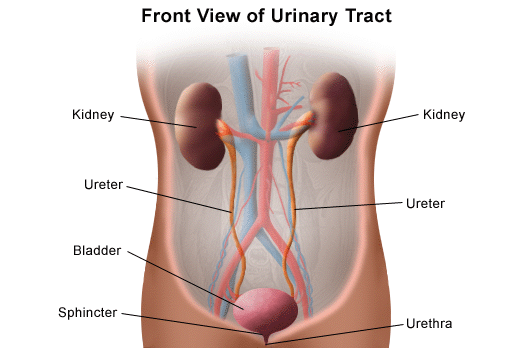What Are the Two Primary Functions of the Urinary System
The urinary system is a group of organs in the body that filters out excess fluid and other substances from the bloodstream. Kidney and urinary system parts and their functions.

Urinary System Definition Function And Organs Biology Dictionary
Once food has been broken down and the body has retrieved what it needs waste.

. It produces a hormone that controls the rate of red blood cell formation. Once produced urine will flow through the ureters into the bladder for. The kidneys make urine by filtering wastes and extra water from blood.
The urinary tract is the bodys drainage system for the eventual removal of urine. The function of the urinary system. Terms in this set 28 What are the 3 primary functions of the urinary system.
Diseases of the urinary system can seriously hamper ones lifestyle and different specialists focus on diseases affecting different parts. The Functions Of the Urinary System is however the main system maintaining the homeostasis of the internal environment. The purpose of the renal urinary system is to eliminate wastes from the body regulate blood volume and pressure control levels of electrolytes and metabolites and regulate blood pH.
The primary function of the PCT is absorption. Removal of metabolic waste products from the body mainly urea and uric acid. Here are a few of them.
The purpose of the urinary system is to eliminate waste from the body regulate blood volume and blood pressure control levels of electrolytes and metabolites and regulate blood pH. Urine travels from the kidneys through two thin tubes called ureters and fills the. Homeostatic regulation - maintaining blood balance and blood pressure.
The kidneys filter the blood to produce urine. Diseases Affecting Function of Urinary System. Excretion - removal of wastes.
Other factors in urinary system function include fluid lost through perspiring and breathing. Filtration Reabsorption and Secretion. There is a secondary diagnosis of delirium related to urosepsis.
- Maintain balance of body fluids and concentration of electrolytes. A client is admitted to the hospital with a tentative diagnosis or urinary retention related to benign prostatic hyperplasia. This pair of purplish-brown organs is located below the ribs toward the middle of the back.
In order to function properly the human body extracts nutrients from food and uses them to produce energy and repair damages. Balance the bodys fluids. - Remove nitrogenous wastes urea creatinine and uric acid - Regulates blood pressure via hormone renin vasodilation.
The urinary system consists of the kidneys ureters bladder and urethra collectively known as the urinary tract this is the pathway that urine is transported through. What are the functional units of. The urinary system also known as the renal system produces stores and eliminates urine the fluid waste excreted by the kidneys.
Adults eliminate about 27 to 68 fluid ounces per day based on typical daily fluid intake of 68 ounces National Institutes of Health. Remove waste products and medicines from the body. The health care provider prescribes the insertion of an indwelling urinary retention catheter.
Elimination - discharge of water products into the environment. These organs work together primarily to create store and eliminate waste namely urine. The urinary system contains the kidneys bladder ureters and urethra.
Following are the main excretory organs in the human body. The urinary system works with the lungs skin and intestines to maintain the balance of chemicals and water in the body. The structures of the urinary system consist of two kidneys two ureters the urinary bladder and the urethra.
Over 60 of the water sodium and chloride is reabsorbed from the filtrate in the PCT. Urinary System Functions Excretion. The main function of the urinary system is to control the volume and composition of blood by removing excess fluid and waste products from the body.
The main functions of the urinary system and its components are to. Urine travels from the kidneys through two thin tubes called ureters and fills the bladder. The simple cuboidal epithelium of the PCT has numerous microvilli on the apical surface which increases the surface area for absorption.
Regulate blood volume and composition eg. The urinary system also known as the renal system produces stores and eliminates urine the fluid waste excreted by the kidneysThe kidneys make urine by filtering wastes and extra water from blood. The purpose of the urinary system is to eliminate waste from the body regulate blood volume and blood pressure control levels of electrolytes and metabolites and regulate blood pH.
Urinary System Function. The urinary system filters the blood from some excess salts urea uric acid and other waste materials and it expels these wastes outside the body in form urine The excretory system removes excess unnecessary materials from the body to prevent the damage and the urinary system rids the body of the wastes produced by. It eliminates a variety of cellular metabolic products such as urea uric acid and creatinine and maintains the water and electrolyte balance of the body.
Sodium potassium and calcium Regulate blood pressure. The main function of the urinary system is to remove excess metabolic waste products and excess fluid from the body. Two sphincter muscles surround the exit of the bladder like a rubber band and prevent the leakage of urine from it.
Functions of the urinary system. Their function is to. The urinary tract is the bodys drainage system for the eventual removal of urine.
The main urinary system function is to filter the blood of excess water salts and waste products temporarily store these within a reservoir and intermittently expel these products from the body.

Urinary System Facts Functions Diseases Excretory System Body Systems Urinary Tract Infection

The Kidneys And Urinary System Human Body Organs Body Organs Human Anatomy Female

Comments
Post a Comment